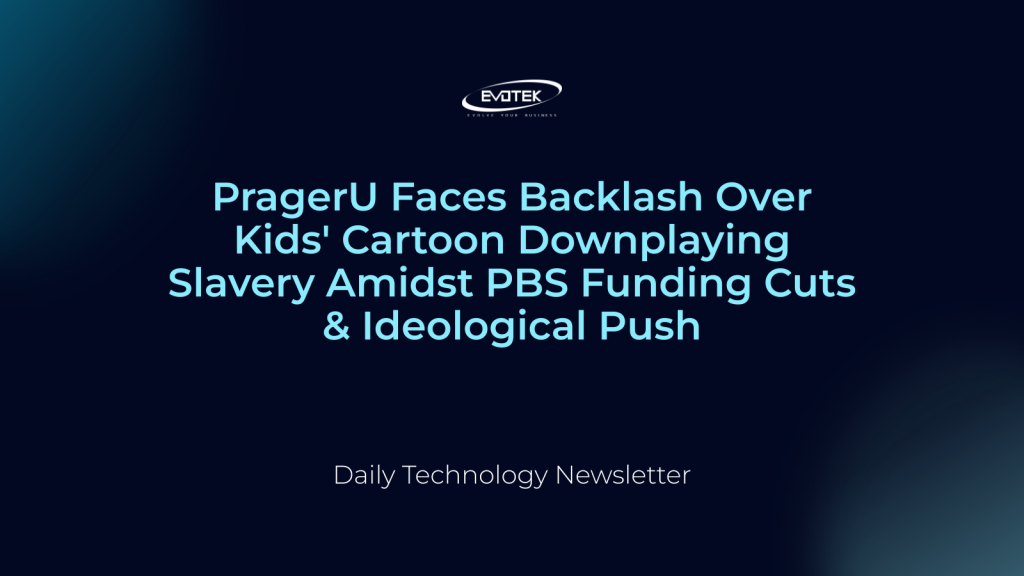A right-wing non-profit media company, PragerU, is currently embroiled in significant controversy. The organization is facing widespread condemnation after a children’s cartoon from its educational library resurfaced, drawing criticism for its problematic portrayal of slavery. This uproar occurs amid ongoing discussions that PragerU could potentially step in as a replacement for long-standing public broadcasting institutions like PBS.
Controversial Content: Slavery as “No Big Deal”
The core of the backlash stems from a specific animated clip featuring a cartoon version of Christopher Columbus. In the video, Columbus offers a disturbing perspective on the institution of slavery, suggesting it was “as old as time and has taken place in every corner of the world.”
The animated figure goes further, stating, “Being taken as a slave is better than being killed, no?” He then prompts young viewers to consider, “Before you judge, you must ask yourself, ‘What did the culture and the society of the time treat as no big deal?’” This particular framing, delivered in a colorful, child-friendly cartoon format, is part of PragerU’s extensive collection of “educational” videos marketed to children.
An Explicit Mission: Indoctrination in Disguise?
Reports from various media outlets highlight that PragerU co-founder Dennis Prager has been unambiguous about the organization’s mission. He has openly admitted that the programming’s goal is to “indoctrinate children into right-wing ideology.”
In its 2022 annual report, PragerU explicitly stated its ambition to directly challenge “massive youth media companies like PBS Kids and Disney.” The company aims to “arm parents and educators with the pro-America content they are craving.” Despite mimicking the style of conventional children’s entertainment, the underlying messages have drawn heavy criticism. Previous PragerU content has reportedly denied Native American history, dismissed Indigenous Peoples’ Day as a source of guilt, rejected climate change, and promoted Islamophobic rhetoric.
State and Federal Endorsements Fuel Concerns
Despite the controversies, PragerU has managed to forge official partnerships with several states, including Alaska, Louisiana, and South Carolina. Notably, Florida became the first state in 2023 to approve PragerU content for use in public school curricula, as confirmed by The Grio.
Further escalating the situation, the Trump administration has provided significant endorsement. On July 24, President Trump signed a bill that slashed $1.1 billion in funding for the Corporation for Public Broadcasting, a move threatening PBS, NPR, and over 1,500 local stations. Just one day later, PragerU collaborated with the Department of Education to unveil a White House museum exhibit titled “The Road to Liberty.” This exhibit controversially utilized AI-generated “commentary” from the Founding Fathers, heavily leaning into conservative talking points.
Reshaping Cultural Institutions Under the Microscope
This initiative aligns with the Trump administration’s broader cultural agenda. Previous reports indicate a “comprehensive review” of Smithsonian museums, including the National Museum of African American History and Culture. The stated aim was to “celebrate American exceptionalism, remove divisive or partisan narratives, and restore confidence in our shared cultural institutions.”
The impact of this push is already being observed. The National Museum of American History temporarily removed references to Trump’s two impeachments. Additionally, National Portrait Gallery director Kim Sajet resigned following claims from Trump that he had fired her.
The Dangerous Path of Revisionist History
Presenting slavery as “no big deal” to children is more than just insensitive; it represents a dangerous form of historical revisionism. With PragerU positioning itself as a potential successor to PBS and a clear effort by the Trump administration to reshape national museums, there’s a visible attempt to rebrand America’s most complex and darkest truths under the guise of “exceptionalism.”
The critical question remains: if foundational historical facts like the brutality of slavery can be minimized or dismissed, what other crucial historical events and narratives might be “erased” or distorted next? The ongoing public debate and calls to #BanPragerU reflect deep concerns about the future of accurate historical education for younger generations.

 日本語
日本語 한국어
한국어 Tiếng Việt
Tiếng Việt 简体中文
简体中文